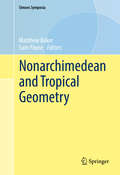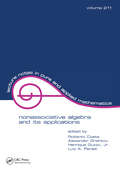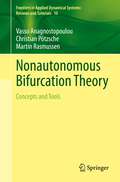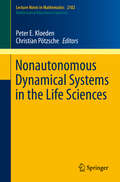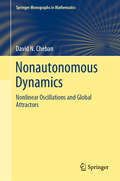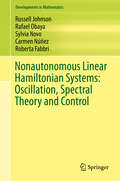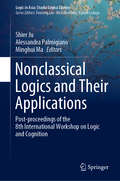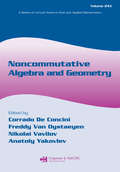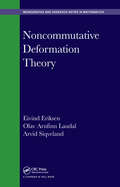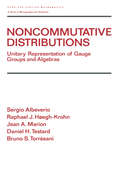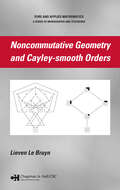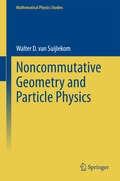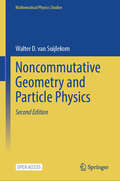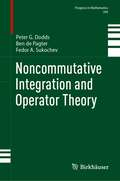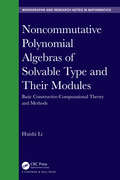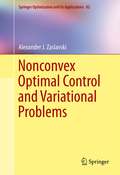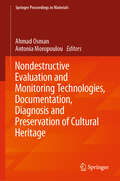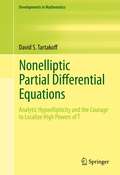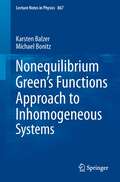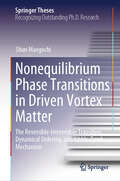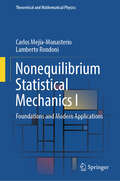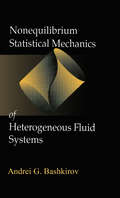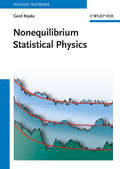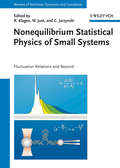- Table View
- List View
Nonarchimedean and Tropical Geometry
by Matthew Baker Sam PayneThisvolume grew out of two Simons Symposia on "Nonarchimedean and tropicalgeometry" which took place on the island of St. John in April 2013 and inPuerto Rico in February 2015. Each meeting gathered a small group of expertsworking near the interface between tropical geometry and nonarchimedeananalytic spaces for a series of inspiring and provocative lectures on cuttingedge research, interspersed with lively discussions and collaborative work insmall groups. The articles collected here, which include high-level surveys aswell as original research, mirror the main themes of the two Symposia. Topicscovered in this volume include: Differential forms and currents, andsolutions of Monge-Ampere type differential equations on Berkovich spaces andtheir skeletons; The homotopy types of nonarchimedean analytifications; The existence of "faithful tropicalizations" which encode the topology andgeometry of analytifications; Relations between nonarchimedean analyticspaces and algebraic geometry, including logarithmic schemes, birationalgeometry, and the geometry of algebraic curves; Extended notions oftropical varieties which relate to Huber's theory of adic spaces analogously tothe way that usual tropical varieties relate to Berkovich spaces; and Relationsbetween nonarchimedean geometry and combinatorics, including deep andfascinating connections between matroid theory, tropical geometry, and Hodgetheory.
NonasSociative Algebra and Its Applications: The Fourth International Conference (Lecture Notes In Pure And Applied Mathematics Ser. #Vol. 211)
by Jr. Roberto Costa Alexander Grishkov Henrique Guzzo Luiz A. PeresiA collection of lectures presented at the Fourth International Conference on Nonassociative Algebra and its Applications, held in Sao Paulo, Brazil. Topics in algebra theory include alternative, Bernstein, Jordan, lie, and Malcev algebras and superalgebras. The volume presents applications to population genetics theory, physics, and more.
Nonautonomous Bifurcation Theory: Concepts and Tools (Frontiers in Applied Dynamical Systems: Reviews and Tutorials)
by Christian Pötzsche Martin Rasmussen Vasso AnagnostopoulouBifurcation theory is a major topic in dynamical systems theory with profound applications. However, in contrast to autonomous dynamical systems, it is not clear what a bifurcation of a nonautonomous dynamical system actually is, and so far, various different approaches to describe qualitative changes have been suggested in the literature. The aim of this book is to provide a concise survey of the area and equip the reader with suitable tools to tackle nonautonomous problems. A review, discussion and comparison of several concepts of bifurcation is provided, and these are formulated in a unified notation and illustrated by means of comprehensible examples. Additionally, certain relevant tools needed in a corresponding analysis are presented.
Nonautonomous Dynamical Systems in the Life Sciences
by Peter E. Kloeden Christian PötzscheNonautonomous dynamics describes the qualitative behavior of evolutionary differential and difference equations, whose right-hand side is explicitly time dependent. Over recent years, the theory of such systems has developed into a highly active field related to, yet recognizably distinct from that of classical autonomous dynamical systems. This development was motivated by problems of applied mathematics, in particular in the life sciences where genuinely nonautonomous systems abound. The purpose of this monograph is to indicate through selected, representative examples how often nonautonomous systems occur in the life sciences and to outline the new concepts and tools from the theory of nonautonomous dynamical systems that are now available for their investigation.
Nonautonomous Dynamics: Nonlinear Oscillations and Global Attractors (Springer Monographs in Mathematics)
by David N. ChebanThis book emphasizes those topological methods (of dynamical systems) and theories that are useful in the study of different classes of nonautonomous evolutionary equations. The content is developed over six chapters, providing a thorough introduction to the techniques used in the Chapters III-VI described by Chapter I-II. The author gives a systematic treatment of the basic mathematical theory and constructive methods for Nonautonomous Dynamics. They show how these diverse topics are connected to other important parts of mathematics, including Topology, Functional Analysis and Qualitative Theory of Differential/Difference Equations. Throughout the book a nice balance is maintained between rigorous mathematics and applications (ordinary differential/difference equations, functional differential equations and partial difference equations). The primary readership includes graduate and PhD students and researchers in in the field of dynamical systems and their applications (control theory, economic dynamics, mathematical theory of climate, population dynamics, oscillation theory etc).
Nonautonomous Linear Hamiltonian Systems: Oscillation, Spectral Theory and Control
by Russell Johnson Rafael Obaya Sylvia Novo Carmen Núñez Roberta FabbriThis monograph contains an in-depth analysis of the dynamics given by a linear Hamiltonian system of general dimension with nonautonomous bounded and uniformly continuous coefficients, without other initial assumptions on time-recurrence. Particular attention is given to the oscillation properties of the solutions as well as to a spectral theory appropriate for such systems. The book contains extensions of results which are well known when the coefficients are autonomous or periodic, as well as in the nonautonomous two-dimensional case. However, a substantial part of the theory presented here is new even in those much simpler situations. The authors make systematic use of basic facts concerning Lagrange planes and symplectic matrices, and apply some fundamental methods of topological dynamics and ergodic theory. Among the tools used in the analysis, which include Lyapunov exponents, Weyl matrices, exponential dichotomy, and weak disconjugacy, a fundamental role is played by the rotation number for linear Hamiltonian systems of general dimension. The properties of all these objects form the basis for the study of several themes concerning linear-quadratic control problems, including the linear regulator property, the Kalman-Bucy filter, the infinite-horizon optimization problem, the nonautonomous version of the Yakubovich Frequency Theorem, and dissipativity in the Willems sense. The book will be useful for graduate students and researchers interested in nonautonomous differential equations; dynamical systems and ergodic theory; spectral theory of differential operators; and control theory.
Nonclassical Logics and Their Applications: Post-proceedings of the 8th International Workshop on Logic and Cognition (Logic in Asia: Studia Logica Library)
by Shier Ju Alessandra Palmigiano Minghui MaThis edited book focuses on non-classical logics and their applications, highlighting the rapid advances and the new perspectives that are emerging in this area. Non-classical logics are logical formalisms that violate or go beyond classical logic laws, and their specific features make them particularly suited to describing and reason about aspects of social interaction. The richness and diversity of non-classical logics mean that this area is a natural catalyst for ideas and insights from many different fields, from information theory to game theory and business science. This volume is the post-proceedings of the 8th International Conference on Logic and Cognition, held at Sun Yat-Sen University Institute of Logic and Cognition (ILC) in Guangzhou, China in December 2016. The conference series started in 2001, and is organized by the ILC, often in collaboration with various international research groups. This eighth installment was jointly organized by ILC and Alessandra Palmigiano's Applied Logic research group. The conference series aims to foster the development of effective logical tools to study social behavior from a philosophical, cognitive and formal perspective in order to challenge the field of logic in ways that open up new and exciting research directions.Chapter "The Category of Node-and-Choice Forms, with Subcategories for Choice-Sequence Forms and Choice-Set Forms" of this book is available open access under a CC BY 4.0 license at link.springer.com
Noncommutative Algebra and Geometry (Lecture Notes in Pure and Applied Mathematics)
by Ian MuehlenhausA valuable addition to the Lecture Notes in Pure and Applied Mathematics series, this reference results from a conference held in St. Petersburg, Russia, in honor of Dr. Z. Borevich. This volume is mainly devoted to the contributions related to the European Science Foundation workshop, organized under the framework of noncommuntative geometry and i
Noncommutative Deformation Theory (Chapman & Hall/CRC Monographs and Research Notes in Mathematics)
by Eivind Eriksen Olav Arnfinn Laudal Arvid SiqvelandNoncommutative Deformation Theory is aimed at mathematicians and physicists studying the local structure of moduli spaces in algebraic geometry. This book introduces a general theory of noncommutative deformations, with applications to the study of moduli spaces of representations of associative algebras and to quantum theory in physics. An essential part of this theory is the study of obstructions of liftings of representations using generalised (matric) Massey products. Suitable for researchers in algebraic geometry and mathematical physics interested in the workings of noncommutative algebraic geometry, it may also be useful for advanced graduate students in these fields.
Noncommutative Distributions: Unitary Representation of Gauge Groups and Algebras (Chapman & Hall/CRC Pure and Applied Mathematics)
by Sergio Albeverio Raphael J. Hoegh-Krohn Jean A. Marion D. Testard B. TorresaniCovering important aspects of the theory of unitary representations of nuclear Lie groups, this self-contained reference presents the general theory of energy representations and addresses various extensions of path groups and algebras.;Requiring only a general knowledge of the theory of unitary representations, topological groups and elementary st
Noncommutative Geometry and Cayley-smooth Orders
by Lieven Le BruynNoncommutative Geometry and Cayley-smooth Orders explains the theory of Cayley-smooth orders in central simple algebras over function fields of varieties. In particular, the book describes the etale local structure of such orders as well as their central singularities and finite dimensional representations.After an introduction to partial d
Noncommutative Geometry and Particle Physics
by Walter D. SuijlekomThis book provides an introduction to noncommutative geometry and presents a number of its recent applications to particle physics. It is intended for graduate students in mathematics/theoretical physics who are new to the field of noncommutative geometry, as well as for researchers in mathematics/theoretical physics with an interest in the physical applications of noncommutative geometry. In the first part, we introduce the main concepts and techniques by studying finite noncommutative spaces, providing a "light" approach to noncommutative geometry. We then proceed with the general framework by defining and analyzing noncommutative spin manifolds and deriving some main results on them, such as the local index formula. In the second part, we show how noncommutative spin manifolds naturally give rise to gauge theories, applying this principle to specific examples. We subsequently geometrically derive abelian and non-abelian Yang-Mills gauge theories, and eventually the full Standard Model of particle physics, and conclude by explaining how noncommutative geometry might indicate how to proceed beyond the Standard Model.
Noncommutative Geometry and Particle Physics (Mathematical Physics Studies)
by Walter D. van SuijlekomThis book provides an introduction to noncommutative geometry and presents a number of its recent applications to particle physics. In the first part, we introduce the main concepts and techniques by studying finite noncommutative spaces, providing a “light” approach to noncommutative geometry. We then proceed with the general framework by defining and analyzing noncommutative spin manifolds and deriving some main results on them, such as the local index formula. In the second part, we show how noncommutative spin manifolds naturally give rise to gauge theories, applying this principle to specific examples. We subsequently geometrically derive abelian and non-abelian Yang-Mills gauge theories, and eventually the full Standard Model of particle physics, and conclude by explaining how noncommutative geometry might indicate how to proceed beyond the Standard Model. The second edition of the book contains numerous additional sections and updates. More examples of noncommutative manifolds have been added to the first part to better illustrate the concept of a noncommutative spin manifold and to showcase some of the key results in the field, such as the local index formula. The second part now includes the complete noncommutative geometric description of particle physics models beyond the Standard Model. This addition is particularly significant given the developments and discoveries at the Large Hadron Collider at CERN over the last few years. Additionally, a chapter on the recent progress in formulating noncommutative quantum theory has been included. The book is intended for graduate students in mathematics/theoretical physics who are new to the field of noncommutative geometry, as well as for researchers in mathematics/theoretical physics with an interest in the physical applications of noncommutative geometry.
Noncommutative Integration and Operator Theory (Progress in Mathematics #349)
by Ben de Pagter Peter G. Dodds Fedor A. SukochevThe purpose of this monograph is to provide a systematic account of the theory of noncommutative integration in semi-finite von Neumann algebras. It is designed to serve as an introductory graduate level text as well as a basic reference for more established mathematicians with interests in the continually expanding areas of noncommutative analysis and probability. Its origins lie in two apparently distinct areas of mathematical analysis: the theory of operator ideals going back to von Neumann and Schatten and the general theory of rearrangement invariant Banach lattices of measurable functions which has its roots in many areas of classical analysis related to the well-known Lp-spaces. A principal aim, therefore, is to present a general theory which contains each of these motivating areas as special cases.
Noncommutative Polynomial Algebras of Solvable Type and Their Modules: Basic Constructive-Computational Theory and Methods (Chapman & Hall/CRC Monographs and Research Notes in Mathematics)
by Huishi LiNoncommutative Polynomial Algebras of Solvable Type and Their Modules is the first book to systematically introduce the basic constructive-computational theory and methods developed for investigating solvable polynomial algebras and their modules. In doing so, this book covers: A constructive introduction to solvable polynomial algebras and Gröbner basis theory for left ideals of solvable polynomial algebras and submodules of free modules The new filtered-graded techniques combined with the determination of the existence of graded monomial orderings The elimination theory and methods (for left ideals and submodules of free modules) combining the Gröbner basis techniques with the use of Gelfand-Kirillov dimension, and the construction of different kinds of elimination orderings The computational construction of finite free resolutions (including computation of syzygies, construction of different kinds of finite minimal free resolutions based on computation of different kinds of minimal generating sets), etc. This book is perfectly suited to researchers and postgraduates researching noncommutative computational algebra and would also be an ideal resource for teaching an advanced lecture course.
Nonconvex Optimal Control and Variational Problems
by Alexander J. ZaslavskiNonconvex Optimal Control and Variational Problems is an important contribution to the existing literature in the field and is devoted to the presentation of progress made in the last 15 years of research in the area of optimal control and the calculus of variations. This volume contains a number of results concerning well-posedness of optimal control and variational problems, nonoccurrence of the Lavrentiev phenomenon for optimal control and variational problems, and turnpike properties of approximate solutions of variational problems. Chapter 1 contains an introduction as well as examples of select topics. Chapters 2-5 consider the well-posedness condition using fine tools of general topology and porosity. Chapters 6-8 are devoted to the nonoccurrence of the Lavrentiev phenomenon and contain original results. Chapter 9 focuses on infinite-dimensional linear control problems, and Chapter 10 deals with "good" functions and explores new understandings on the questions of optimality and variational problems. Finally, Chapters 11-12 are centered around the turnpike property, a particular area of expertise for the author. This volume is intended for mathematicians, engineers, and scientists interested in the calculus of variations, optimal control, optimization, and applied functional analysis, as well as both undergraduate and graduate students specializing in those areas. The text devoted to Turnpike properties may be of particular interest to the economics community.
Nondestructive Evaluation and Monitoring Technologies, Documentation, Diagnosis and Preservation of Cultural Heritage (Springer Proceedings in Materials)
by Antonia Moropoulou Ahmad OsmanThis book highlights the benefits of Non-Destructive Testing (NDT) methods and their applications on several cultural heritage sites including the Holy Selphuchre Monitoring System in Jerusalem. This book demonstrates Nondestructive sensing technologies and inspection modules as main tools for documentation, diagnosis, characterization, preservation planning, monitoring and quality of restoration, assessment and evaluation of material and preservation work.
Nonelliptic Partial Differential Equations
by David S. TartakoffThis book provides a very readable description of a technique, developed by the author years ago but as current as ever, for proving that solutions to certain (non-elliptic) partial differential equations only have real analytic solutions when the data are real analytic (locally). The technique is completely elementary but relies on a construction, a kind of a non-commutative power series, to localize the analysis of high powers of derivatives in the so-called bad direction. It is hoped that this work will permit a far greater audience of researchers to come to a deep understanding of this technique and its power and flexibility.
Nonequilibrium Green's Functions Approach to Inhomogeneous Systems
by Karsten Balzer Michael BonitzThis book offers a self-contained introduction to non-equilibrium quantum particle dynamics for inhomogeneous systems, including a survey of recent breakthroughs pioneered by the authors and others. The approach is based on real-time Green's functions.
Nonequilibrium Many-Body Theory of Quantum Systems
by Gianluca Stefanucci Robert Van LeeuwenThe Green's function method is one of the most powerful and versatile formalisms in physics, and its nonequilibrium version has proved invaluable in many research fields. This book provides a unique, self-contained introduction to nonequilibrium many-body theory. Starting with basic quantum mechanics, the authors introduce the equilibrium and nonequilibrium Green's function formalisms within a unified framework called the contour formalism. The physical content of the contour Green's functions and the diagrammatic expansions are explained with a focus on the time-dependent aspect. Every result is derived step-by-step, critically discussed and then applied to different physical systems, ranging from molecules and nanostructures to metals and insulators. With an abundance of illustrative examples, this accessible book is ideal for graduate students and researchers who are interested in excited state properties of matter and nonequilibrium physics.
Nonequilibrium Phase Transitions in Driven Vortex Matter: The Reversible-Irreversible Transition, Dynamical Ordering, and Kibble-Zurek Mechanism (Springer Theses)
by Shun MaegochiThis book presents experimental studies of nonequilibrium phase transitions induced by ac and dc forces in collectively interacting systems—a superconducting vortex system with random pinning. It first shows that a phase transition from reversible to irreversible flow occurs by increasing vortex density as well as amplitude of ac shear, which is indicative of the universality of the reversible-irreversible transition. Two distinct flow regimes are also found in the reversible phase. Next, the book presents new methods for dc driven experiments—transverse mode-locking and transverse current-voltage measurements—and provides convincing evidence of the second-order dynamical transition from disordered plastic to anisotropically ordered smectic flow. Lastly it reports on the first experimental demonstration of the Kibble-Zurek mechanism for the nonequilibrium phase transition.The experimental results indicate that both the reversible-irreversible transition and the dynamical ordering transition belong to the directed percolation universality class which is one of the fundamental classes of nonequilibrium phase transitions. Hence, the findings will be generalized to other nonequilibrium systems and stimulate research on nonequilibrium physics.
Nonequilibrium Statistical Mechanics I: Foundations and Modern Applications (Theoretical and Mathematical Physics)
by Lamberto Rondoni Carlos Mejía-MonasterioThis textbook offers a clear, unified introduction to nonequilibrium statistical mechanics. It combines the classical foundations of equilibrium and nonequilibrium thermodynamics with the field's latest advances. Key topics include Brownian motion, fluctuations theory, the Boltzmann equation, and probability measures in phase space. A common mathematical framework links linear-response theory, transport processes, large-deviation principles, and stochastic dynamics. A companion Volume II will extend the discussion to applications such as anomalous transport, living matter, molecular dynamics, and open quantum systems. The book is written for researchers in applied mathematics, theoretical physics, biophysics, and theoretical chemistry who study nonequilibrium phenomena. It is equally suited to graduate students seeking an accessible path to advanced topics in thermodynamics, transport theory, fluctuation dynamics, and dissipation. It also serves as a reference for graduate courses on statistical mechanics, stochastic systems, and quantum thermodynamics.
Nonequilibrium Statistical Mechanics of Heterogeneous Fluid Systems
by Andrei G. BashkirovThere is a wide variety of heterogeneous fluid systems that possess interphase surfaces. This monograph is devoted to pioneering studies in nonequilibrium statistical mechanics of such systems. Starting from the Liouville equation, the equations of surface hydrodynamics are derived with allowance for discontinuities of thermodynamic parameters of interphase boundaries. Brownian motion of a large solid particle in a fluid and nucleation are treated as results of fluctuations of flows across particle surfaces. With the use of the Gibbs method, a shock wave in a gas is considered as a sort of an interphase surface, and the surface tension of a shock front is introduced for the first time.
Nonequilibrium Statistical Physics
by Gerd RöpkeAuthored by a well-known expert in the field of nonequilibrium statistical physics, this book is a coherent presentation of the subject suitable for masters and PhD students, as well as postdocs in physics and related disciplines. Starting from a general discussion of irreversibility and entropy, the method of nonequilibrium statistical operator is presented as a general concept. Stochastic processes are introduced as a necessary prerequisite to describe the evolution of a nonequilibrium state. Different standard approaches such as master equations, kinetic equations and linear response theory, are derived after special assumptions. This allows for an insight into the problems of nonequilibrium physics, a discussion of the limits of the approaches, and suggestions for improvements. The method of thermodynamic Green's function is outlined that allows for the systematic quantum statistical treatment of many-body systems. Applications and typical examples are given, as well as fully worked problems.
Nonequilibrium Statistical Physics of Small Systems
by Heinz Georg Schuster Christopher Jarzynski Rainer Klages Wolfram JustThis book offers a comprehensive picture of nonequilibrium phenomena in nanoscale systems. Written by internationally recognized experts in the field, this book strikes a balance between theory and experiment, and includes in-depth introductions to nonequilibrium fluctuation relations, nonlinear dynamics and transport, single molecule experiments, and molecular diffusion in nanopores.The authors explore the application of these concepts to nano- and biosystems by cross-linking key methods and ideas from nonequilibrium statistical physics, thermodynamics, stochastic theory, and dynamical systems. By providing an up-to-date survey of small systems physics, the text serves as both a valuable reference for experienced researchers and as an ideal starting point for graduate-level students entering this newly emerging research field.
